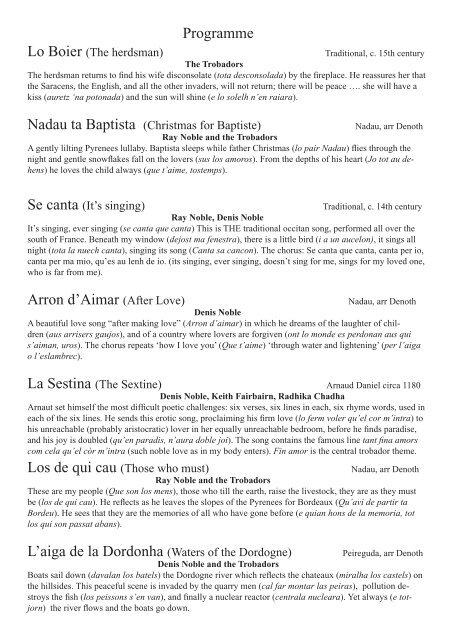Create successful ePaper yourself
Turn your PDF publications into a flip-book with our unique Google optimized e-Paper software.
Programme<br />
Lo Boier (The herdsman) Traditional, c. 15th century<br />
The <strong>Trobadors</strong><br />
The herdsman returns to fi nd his wife disconsolate (tota desconsolada) by the fi replace. He reassures her that<br />
the Saracens, the English, and all the other invaders, will not return; there will be peace …. she will have a<br />
kiss (auretz ‘na potonada) and the sun will shine (e lo solelh n’en raiara).<br />
Nadau ta Baptista (Christmas for Baptiste) Nadau, arr Denoth<br />
Ray Noble and the <strong>Trobadors</strong><br />
A gently lilting Pyrenees lullaby. Baptista sleeps while father Christmas (lo pair Nadau) fl ies through the<br />
night and gentle snowfl akes fall on the lovers (sus los amoros). From the depths of his heart (Jo tot au dehens)<br />
he loves the child always (que t’aime, tostemps).<br />
Se canta (It’s singing) Traditional, c. 14th century<br />
Ray Noble, Denis Noble<br />
It’s singing, ever singing (se canta que canta) This is THE traditional occitan song, performed all over the<br />
south of France. Beneath my window (dejost ma fenestra), there is a little bird (i a un aucelon), it sings all<br />
night (tota la nuech canta), singing its song (Canta sa cancon). The chorus: Se canta que canta, canta per io,<br />
canta per ma mio, qu’es au lenh de io. (its singing, ever singing, doesn’t sing for me, sings for my loved one,<br />
who is far from me).<br />
Arron d’Aimar (After Love) Nadau, arr Denoth<br />
Denis Noble<br />
A beautiful love song “after making love” (Arron d’aimar) in which he dreams of the laughter of children<br />
(aus arrisers gaujos), and of a country where lovers are forgiven (ont lo monde es perdonan aus qui<br />
s’aiman, uros). The chorus repeats ‘how I love you’ (Que t’aime) ‘through water and lightening’ (per l’aiga<br />
o l’eslambrec).<br />
La Sestina (The Sextine) Arnaud Daniel circa 1180<br />
Denis Noble, Keith Fairbairn, Radhika Chadha<br />
Arnaut set himself the most diffi cult poetic challenges: six verses, six lines in each, six rhyme words, used in<br />
each of the six lines. He sends this erotic song, proclaiming his fi rm love (lo ferm voler qu’el cor m’intra) to<br />
his unreachable (probably aristocratic) lover in her equally unreachable bedroom, before he fi nds paradise,<br />
and his joy is doubled (qu’en paradis, n’aura doble joi). The song contains the famous line tant fi na amors<br />
com cela qu’el còr m’intra (such noble love as in my body enters). Fin amor is the central trobador theme.<br />
Los de qui cau (Those who must) Nadau, arr Denoth<br />
Ray Noble and the <strong>Trobadors</strong><br />
These are my people (Que son los mens), those who till the earth, raise the livestock, they are as they must<br />
be (los de qui cau). He refl ects as he leaves the slopes of the Pyrenees for Bordeaux (Qu’avi de partir ta<br />
Bordeu). He sees that they are the memories of all who have gone before (e quian hons de la memoria, tot<br />
los qui son passat abans).<br />
L’aiga de la Dordonha (Waters of the Dordogne) Peireguda, arr Denoth<br />
Denis Noble and the <strong>Trobadors</strong><br />
Boats sail down (davalan los batels) the Dordogne river which refl ects the chateaux (miralha los castels) on<br />
the hillsides. This peaceful scene is invaded by the quarry men (cal far montar las peiras), pollution destroys<br />
the fi sh (los peissons s’en van), and fi nally a nuclear reactor (centrala nucleara). Yet always (e totjorn)<br />
the river fl ows and the boats go down.


